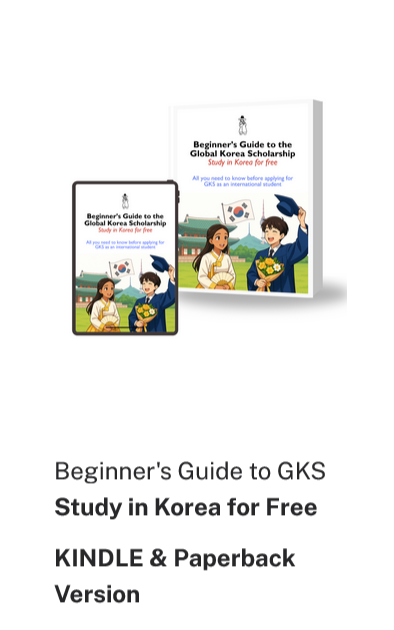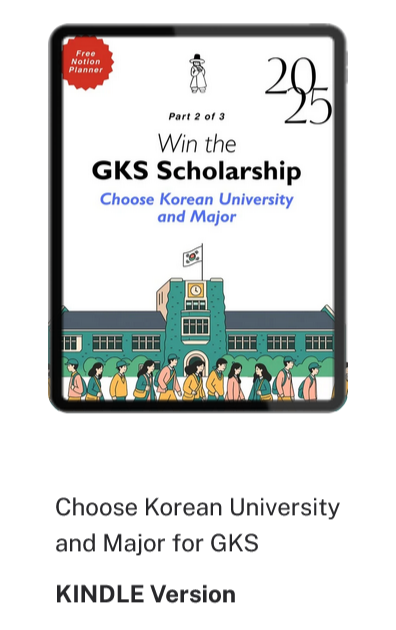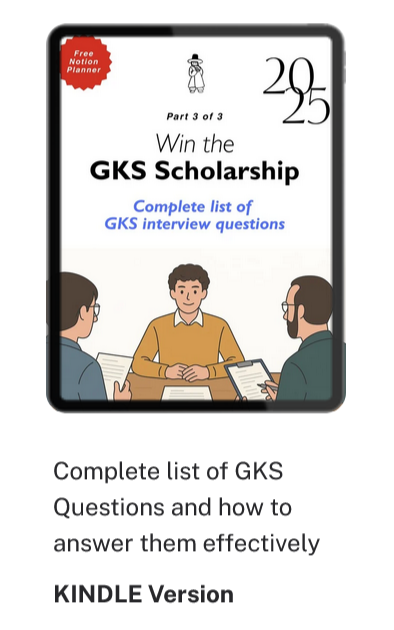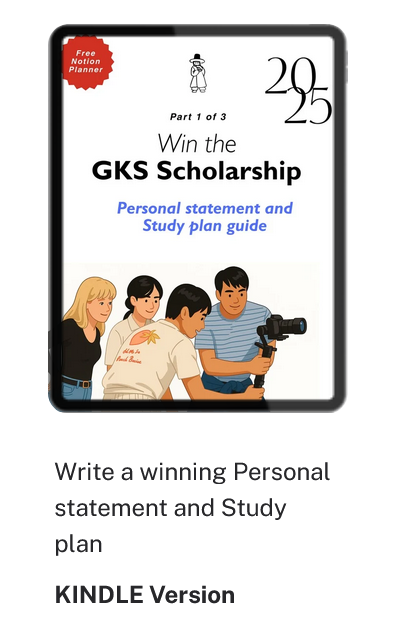
How to Apply for the GKS Scholarship in 2026?
Step by step process to maximize your chances of successfully applying for the fully funded scholarship to study in South Korea for Free as an international student.

On top of that, you get a generous monthly stipend paid straight to your bank account. It’s honestly a lot for any country to offer—but Korea does it to support deserving students who are eager to come, learn, grow, and contribute to its economy and world-class research and development industry.
The Global Korea Scholarship (GKS) is a prestigious, fully-funded scholarship program offered by the Korean government. It allows international students to study undergraduate, master’s, doctoral, or research programs at top universities in South Korea — with all major expenses covered. This includes tuition, living costs, airfare, and more.
The idea of having all your expenses paid for, from tuition to airfare and even living costs, sounds like the perfect opportunity. It’s not just about free education. It’s about the chance to live in a new country, experience life as an international student, and chase the best academic opportunities to fulfil your dreams.
This is truly a once-in-a-lifetime experience. And while it may seem rare and competitive to win the scholarship, once you understand how the application works, you’ll be in a much better place to confidently apply.
Who is Eligible?
To apply for GKS, you must meet these basic requirements:
- Be a citizen of a country designated by the National Institute for International Education (NIIED) of Korea
- Be under 40 years of age (for master’s, doctoral, and research applicants)
- Be under 25 years of age (for undergraduate applicants)
- Have a GPA of 80% or above, or rank in the top 20% of your class
- Be in good physical and mental health
When to Apply?
Undergraduate program: Applications usually open in September each
year
Graduate programs (Master’s, Doctoral): Applications usually open
in March
What Does the Scholarship Cover?
- Full tuition fee waiver
- Round-trip airfare (from your country to Korea and back)
- Monthly living stipend
- Research allowance (graduate programs only)
- Medical insurance
- 1-year Korean language training (fully funded)
- TOPIK exam fee reimbursement
- Degree completion grant
- Additional incentives for academic excellence
Now let's go through the application process of how to apply for the GKS scholarship in 2026
The process is easy to understand but there's several steps in between that you need to grasp by first going through the guidelines.
1
Start with official guidelines
The first thing you need to do is download the official GKS application guidelines. These are available as a PDF and include all the key details.
This one document will explain the full eligibility criteria, the required documents, the timeline, and even give you access to the official application forms.
It also includes a list of all the participating Korean universities and the majors they offer under this scholarship.
2
Choose an application track
There are two choices to either choose University Track or Embassy Track for scholarship applications. You can choose up to three universities under the embassy track, the chosen major should be consistent across the universities you list.
On the other hand, if you decide to apply through the university track, you can apply to only one university. You cannot apply through both tracks in the same year.
So once you choose your preferred track, you also decide how many universities you will be applying to. This step is critical, so take your time to research properly.
3
Choosing Your University and Major
From the provided list, you’ll need to select Korean universities that offer your preferred major.
From the official list provided by the GKS website, you need to select a university that offers your preferred major.
The program covers a wide range of departments across multiple fields, but it is especially well-suited for students from engineering, IT, and technical backgrounds due to Korea’s strong R&D focus.
4
Prepare and Organize Your Documents
Once you’ve selected your track and your preferred universities, the next step is to prepare all the required documents.
This is where the actual application work begins. Download the application checklist from the official guidelines and use it to make sure you gather everything that is needed.
Each document must match the format and requirement laid out by GKS. These include personal identification documents, academic transcripts, proof of citizenship for both you and your parents, recommendation letters, and more depending on your academic level.
Make sure to organise and arrange the documents in the correct order, especially if you're applying through the embassy track where multiple copies are required.
Need help in proofreading your GKS
Personal statement and study plan ?
WHATSAPP ME 5
Submit to Embassy or University
Once your documents are complete and properly arranged, you’ll submit them either to the Korean Embassy in your home country or to the Korean university you’re applying to, depending on your chosen track.
Embassy track applicants send their full set of documents to the Korean Embassy. University track applicants send their application directly to the admissions office of the selected Korean university.
Be sure to track deadlines carefully for each route, as they are different and very strict.
6
Screening and Interview Process
After submission, the evaluation phase begins. If you applied through the embassy track, the Korean Embassy in your country will screen your documents and conduct interviews with shortlisted candidates.
If you applied through the university track, the university will assess your documents and directly recommend selected candidates to NIIED, which is the Korean government body managing the GKS program.
At this stage, shortlisted names are forwarded for final consideration.
7
Final Selection by NIIED
Next comes the official review by Selection Committee. They go through the recommendations made by either the embassy or the university and make the final decisions.
This is where your application enters the final selection phase. Around this time, you’ll also need to submit your medical assessment form, which is an essential part of the final review process.
8
Final Result Announcement
Once the NIIED completes the evaluation, the final results are announced. If your name appears on this list.
From this point, you’ll receive further instructions on visa processing, university enrolment, and travel arrangements.
Global Korea Scholarship
Application FAQs

What fields of study are available under the Global Korea Scholarship (GKS)?
The GKS program covers a wide range of academic fields, ensuring that students from nearly every background can find their place. Whether you're from a STEM discipline like Engineering, IT, Natural Sciences, or Medical studies, or from non-technical fields such as Business, Hotel Management, Education, Humanities, or Social Sciences — GKS has something for you. It even includes Language and Cultural Studies.
To explore the full list of available majors and departments, always refer to the official University Information file available on studyinkorea.go.kr, the official Korean government website. Do not rely on third-party lists.
Some universities are better known for certain subjects. This means competition may vary depending on the university and your chosen field, so choose wisely based on your strengths and goals.
List of available Universities

What are the selection chances for GKS, and how tough is the process?
The GKS process is highly competitive, with only about 15% of applicants selected. It is heavily grade-focused, but grades aren’t the only factor that matters.
Many applicants have been selected despite not having top-tier marks simply because they submitted a strong personal statement and a well-aligned study plan and performed well in the interview.
If you'd like to improve your chances, I’ve created resources specifically designed to help you stand out in the selection process.
What are the main evaluation criteria and preferences in GKS selection?
The main evaluation points for GKS include both document screening and interviews. Here’s how it works:
- The selection committee examines your documents to verify your citizenship, education level, and academic grades to determine whether you are qualified for the program and the major you selected.
- You will also be assessed on your overall competency, which includes both your submitted documents and your interview performance.
- If you have a TOPIK Level 3 or above, you receive an additional 10% in your evaluation score.
- If you are a descendant of a Korean War veteran who served in the war through a foreign military, you are awarded an additional 5%.
- If you do not submit a language proficiency certificate, then your personal statement and study plan become crucial evaluation components.
Evaluation Preferences for GKS Applicants
In addition to the standard screening and interviews, the GKS selection process includes preference-based evaluation. Here’s who gets priority:
- Overseas Koreans are given the highest preference.
- Applicants from low-income families or underprivileged backgrounds come next.
- Those applying to Natural Science and Engineering majors at regional universities (Type B) are prioritized.
- Current academic professors applying to Natural Science and Engineering fields are also preferred.
- Applicants with strong English or Korean proficiency certificates receive additional consideration.
- Postdoctoral research applicants in the Natural Science and Engineering fields are favored too.



